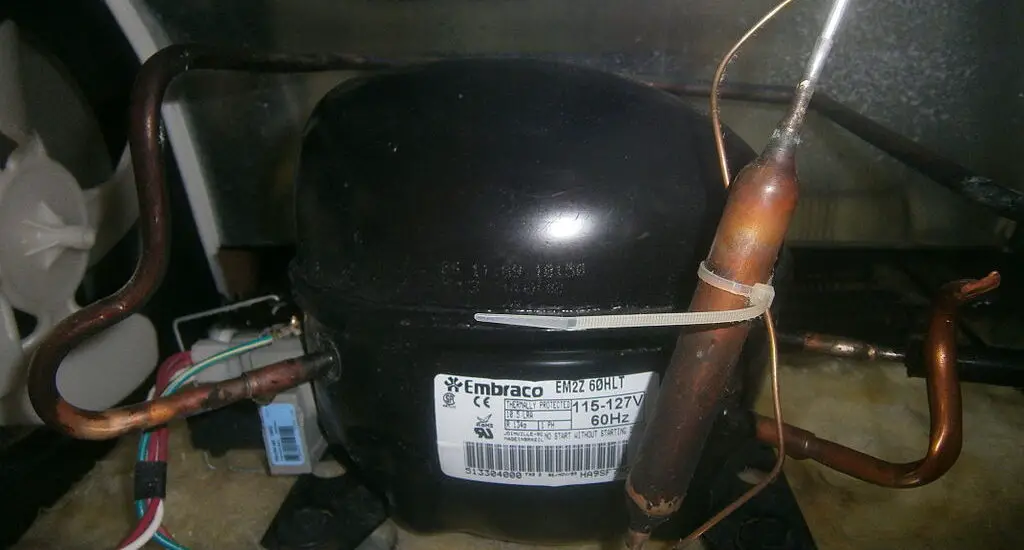When your fridge starts acting up, it could be displaying signs of refrigerator compressor failure. This article aims to provide you with a thorough understanding of these signs so you can take timely action.

Table of Contents
Signs of Refrigerator Compressor Failure
Below are some of the common signs of refrigerator compressor failure:
Sign 1: Your Refrigerator is Not Cooling Properly
The most obvious sign that your compressor might be failing is when your fridge isn’t cooling your food as it should. You may notice that milk spoils quicker, vegetables wilt, or the ice cream in the freezer is mushy.
You can confirm this issue by using a dedicated refrigerator thermometer. A good example is this Taylor 5924 Large Dial Kitchen Refrigerator and Freezer Kitchen Analog Thermometer listed on Amazon.
Insert the thermometer and wait for 5-10 minutes before reading the temperature. Compare this with the optimal temperature settings for your fridge, which is generally 37°F (2.8°C) for the fridge and 0°F (-18°C) for the freezer. If there’s a considerable difference, it’s likely that the compressor is not functioning effectively.
Sign 2: Unusual Noises
All refrigerators make some noise during normal operation, usually a humming or buzzing sound. However, if you hear grinding, clicking, or buzzing noises that you haven’t heard before, it’s a sign that the compressor might be in distress.
These noises are caused by the motor inside the compressor struggling to maintain the needed pressure. In simpler terms, your fridge is working too hard and is probably not long for this world unless you address the issue.
Sign 3: The Compressor is Overly Hot
The compressor usually gets warm during operation, but it should never be hot to the touch. If it feels hot, especially if you notice a burning smell, it’s a clear sign that the compressor is overheating.
This is dangerous and could lead to complete compressor failure or even a fire hazard. If you notice this, unplug your fridge and call a technician immediately.
Sign 4: Fridge is Running Continuously
Normally, your fridge will cycle on and off throughout the day to maintain the set temperature. But if it’s running all the time without stopping, it’s a sign that the compressor is having difficulty maintaining the temperature.
This not only overworks the compressor but also increases your electricity bills significantly. Use an electricity usage monitor to measure the energy consumption, if it’s much higher than normal, the compressor is likely at fault.
Sign 5: Ice Build-up Inside
A small amount of frost in the freezer is normal. However, if you notice a thick layer of ice forming on the walls or the floor of your freezer, it indicates a problem.
The compressor’s failure to circulate refrigerant properly can lead to uneven cooling, which in turn leads to ice build-up. It can also cause water leakage when the ice melts. Be sure to defrost and clean your freezer regularly to check for this issue.
Check out these other articles…
Refrigerator Compressor Issues: How to Fix Them Like a Pro
Refrigerator Compressor Just Clicks: 5 Easy Steps to Fix It
Refrigerator Compressor Just Hums: Easy Steps to Fix It
Refrigerator Compressor Keeps Clicking: 4 Simple Fixes
Refrigerator Compressor Keeps Clicking On and Off: Fixed
Refrigerator Compressor Leaking Water: Fixed in 6 Easy Steps
What to Do When You Spot These Signs
If you notice one or more of these signs, it’s crucial to consult a professional technician immediately. While some people may be tempted to troubleshoot these issues on their own, the compressor is a complex component that requires specialized tools and expertise for accurate diagnosis and repair. In some cases, it might be more cost-effective to replace the refrigerator rather than repair the compressor.